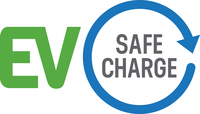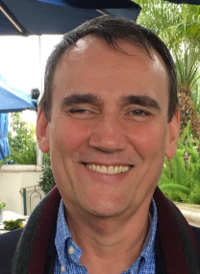Friday, January 18, 2019
Interview With Caradoc Ehrenhalt, EV Safe Charge

In a world where more and more drivers are moving to electric vehicles, where is EV charging today? To better understand exactly where EV technology is today, we caught up with Caradoc Ehrenhalt, the CEO and founder of a Los Angeles startup, EV Safe Charge (www.evsafecharge.com), to chat a bit about his view of where EV charging technology today. EV Safe Charge rents out EV chargers for events, in addition to having its own business installing charging stations.
What is EV Safe Charge?

Caradoc Ehrenhalt: EV Safe Charge started when I got an electric vehicle, for the environment. The dealer didn't have much information or knowledge on how to get a charger installed, or where to go and find an electrician, and I figured that others also were experiencing this as well. It turned out, that was definitely the case, and that's how the company was created. We started doing residential installations, and then commercial installations. We haven't done any paid marketing or advertising, but more and more companies are finding us, and our business has started developing. It's been an exciting two years. We were fortunate to be approached to provide mobile EV charging for Jaguar, and have developed that solution, and it's now a big part of our business. With that project, we provide level 2 and DC fast chargers, providing everything needed for successful EV charging at events, anywhere in this country or Canada. After doing the work for an internal event for them, that led to external, customer-facing launch events around the country. Since then, we have had our chargers on movie studio sets for actors and crew to use for major Hollywood movies, and have also supplied charging equipment for motorcycle companies. One of the things we've also done recently, is launch a consulting division, to help companies navigate any of the complex issues to get a charger installed, such as dealing with ADA Compliance. Finally, something I had always wanted as an EV driver, was a really amazing app to help with everything an EV driver would want on the road, and we just announced a partnership at CES with Sumitomo Electric for an app, EV Safe Charge, Powered by Sumitomo Electric.
When you're providing chargers for your event, do you run into the issues with all of the different kind of electric vehicles that need to be charged?
Caradoc Ehrenhalt: We are charger and software agnostic. We present the best solution for a customer and their needs, and we work with the top EV charger manufacturers and software providers to accomplish that We coordinate everything needed for an event. Anything from the chargers, to generators, to staff, and transportation of equipment to wherever it is needed. One of the challenges we do run into with events, is not having power on site, and not having enough power to supply a potentially large number of DC fast chargers.. The events we've run have been 24/7 with a large number of vehicles, a large number of chargers. So, today, the way we have to power those chargers with electricity is with generators. What we've been doing is offsetting our carbon footprint by planting trees with the Arbor Day Foundation. Unfortunately, that's been necessary because often grid power is not available. However, the company was formed for the environment, and it's really in the company's DNA, and the environment is something that our customers focus on, plus our white glove service and all that. But, we feel it's better to have that experience of people being able to experience and use EVs, even if those EVs have to be recharged today with generators in the field, rather than what we'd like, with solar, wind, or other renewables. Unfortunately, today, for a large number of chargers running 24/7, that needs a lot of power and we have to use generators.
As a company that uses a lot of chargers, where do you think the industry is today with standardization on that technology?
Caradoc Ehrenhalt: That's a really good question. For the consumer, it is confusing. The fact is there are different plugs and different standards. The good news, is the J1772 standard really does work with every car, because Teslas have the adapter available. Unfortunately, Tesla chargers don't charge other cars. That would be very nice, and I think that would be great for the industry. The different standards for fast charging does create some confusion for consumers. The good news, is we have machines with two plugs which can charge any car. Another interesting question we get is that some consumers still have a question about safely handling a charger. If it's raining, or if your car is in a puddle of water, consumers wonder if it is safe. We do run into a lot of questions about that, and it's safe to charge. The industry has been amazing in developing standards about how to communicate between a car and charger and how to handshake between them for safety, so we end up explaining that and doing a fair amount of education to let people know about that. The number one barrier today is range anxiety, which is now being solved with longer ranges and charger availability.
What were you doing before this?
Caradoc Ehrenhalt: My last corporate job was in new revenue models at Avery Dennison, which makes products like labels, binders, and highlighter pens. My background has always been inventing products, and have several patents, and I have a passion for bringing new things to life, making partnerships, like the one with Sumitomo Electric. It's very exciting to me. Always creating and promoting and helping people brings things to life is really one of my passions.
Any big lessons you've learned creating a startup after being at a big company?
Caradoc Ehrenhalt: I've been at startups before, before Avery Dennison, and after, as a serial entrepreneur creating different products and inventions. The biggest lesson, is it's truly hard work, long hours, and weekends and nights at a startup. Almost, on a daily basis, there's both something amazing and something challenging happening. It's really dealing with those challenges and being able to pivot when you need to that is important. When I started this business, I never imagined we'd be doing rental chargers and launching this consumer app. Being able to pivot in a new direction is very important for entrepreneurs, and never giving up, never letting anything stand in the way of moving forwards. If you're knocked down, pick yourself up. Those are typically things you hear from entrepreneurs, because they are so true. It's really hard, and there are always lots of challenges. Right now, we are getting ready for a Series A after just a little bit of friends and family funding. Over the last few years, it's really been a grass roots, true startup. We're now at the point we're ready to develop into much more of a company, with more employees, and that brings challenges as well. I think the lessons are really being able to pivot, deal with all the challenges an entrepreneur comes across and has to deal with, to have a positive attitude, and be able to look at things that you may consider impossible and say yes, we can do that, and be willing to learn and really focus on bringing solutions to our customers. We've been really fortunate to get amazing feedback from our customers, and we've been told by them that they'd called a few companies, been told they couldn't do it, and we've even been called a godsend because we said yes and were able to come up with a solution for them. We said yes, let's figure it out, and come up with a solution that really satisfies your needs. It's that one hundred percent focus on the customer that leads to all things.
Thanks!